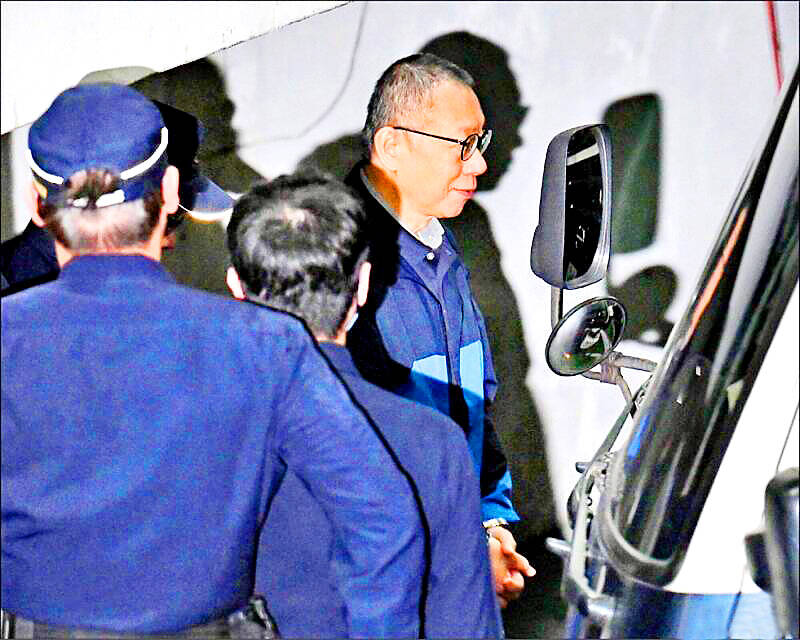Taiwan People’s Party (TPP) Chairman Ko Wen-je (柯文哲), who has been detained and held incommunicado without charge for more than 100 days, has been granted permission to send a resignation letter to his party.
The Taipei District Court yesterday ruled that Ko’s request would not interfere with the ongoing investigation into his alleged involvement in the Core Pacific City bribery case during his second term as Taipei mayor.
The leader of Taiwan’s third-largest political party is being held at a detention center in New Taipei City’s Tucheng District (土城) and is not allowed to contact people outside.

Photo: Taipei Times
Prosecutors cited fears that Ko would collude with suspected co-conspirators or interfere with the investigation for the blanket gag order.
Ko submitted a request recently to lift restrictions on sending and receiving letters to deliver his resignation letter to TPP Secretary-General Vincent Chou (周榆修).
The court said that the decision was made in consultation with Taipei prosecutors, and it agreed that Ko’s resignation letter was unrelated to the investigation and posed no risk of collusion or interference.
A court official said that any lifting of restrictions on detainees — such as detention conditions, visitation rights or communication — is specific and based on applications submitted by prosecutors and detainees.
Yesterday’s ruling only granted Ko permission to send a resignation letter and does not extend to other correspondence unrelated to his resignation, the official added.
The TPP in response to the ruling questioned the court’s interpretation of its rules and regulations.
The court said that Ko’s resignation declaration would take legal effect automatically once submitted to the party.
The TPP said it had not yet received Ko’s letter, adding that the party, not the court, should decide internal party matters.
Ko was summoned for further questioning yesterday morning, arriving at the Taipei District Prosecutors’ Office at 9:10am, following an eight-hour interrogation the previous day.
Taipei prosecutors are expected to finish their investigations next week.

Taiwan is to commence mass production of the Tien Kung (天弓, “Sky Bow”) III, IV and V missiles by the second quarter of this year if the legislature approves the government’s NT$1.25 trillion (US$39.78 billion) special defense budget, an official said yesterday. Commenting on condition of anonymity, a defense official with knowledge of the matter said that the advanced systems are expected to provide crucial capabilities against ballistic and cruise missiles for the proposed “T-Dome,” an advanced, multi-layered air defense network. The Tien Kung III is an air defense missile with a maximum interception altitude of 35km. The Tien Kung IV and V

The disruption of 941 flights in and out of Taiwan due to China’s large-scale military exercises was no accident, but rather the result of a “quasi-blockade” used to simulate creating the air and sea routes needed for an amphibious landing, a military expert said. The disruptions occurred on Tuesday and lasted about 10 hours as China conducted live-fire drills in the Taiwan Strait. The Civil Aviation Administration (CAA) said the exercises affected 857 international flights and 84 domestic flights, affecting more than 100,000 travelers. Su Tzu-yun (蘇紫雲), a research fellow at the government-sponsored Institute for National Defense and Security Research, said the air

Trips for more than 100,000 international and domestic air travelers could be disrupted as China launches a military exercise around Taiwan today, Taiwan’s Civil Aviation Administration (CAA) said yesterday. The exercise could affect nearly 900 flights scheduled to enter the Taipei Flight Information Region (FIR) during the exercise window, it added. A notice issued by the Chinese Civil Aviation Administration showed there would be seven temporary zones around the Taiwan Strait which would be used for live-fire exercises, lasting from 8am to 6pm today. All aircraft are prohibited from entering during exercise, it says. Taipei FIR has 14 international air routes and

Taiwan lacks effective and cost-efficient armaments to intercept rockets, making the planned “T-Dome” interception system necessary, two experts said on Tuesday. The concerns were raised after China’s military fired two waves of rockets during live-fire drills around Taiwan on Tuesday, part of two-day exercises code-named “Justice Mission 2025.” The first wave involved 17 rockets launched at 9am from Pingtan in China’s Fujian Province, according to Lieutenant General Hsieh Jih-sheng (謝日升) of the Office of the Deputy Chief of the General Staff for Intelligence at the Ministry of National Defense. Those rockets landed 70 nautical miles (129.6km) northeast of Keelung without flying over Taiwan,